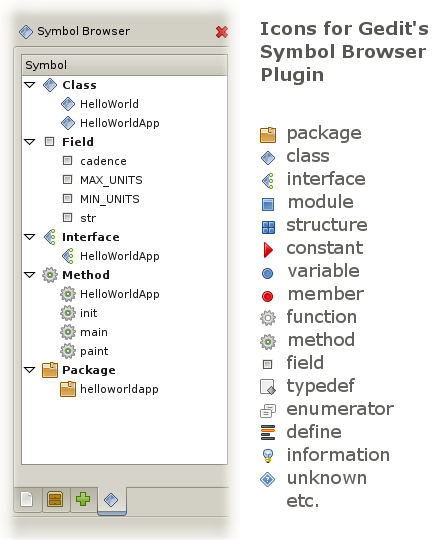
The right ALT key leaps right, that means typing while keeping it depressed searches forward in the document. Part of this editor is testing how well a quasimode variation of searching called 'leaping' works in a programming environment. Incremental searching is a powerful concept, and here we use it even more. Leaping: The hands should not leave touch typing position I have implemented two quasimodes based on the Archy editor:ġ.


Replacing that is the quasimode: a mode that remains active as long as a key is depressed. One of the ideas is that of modelessness. The Humane Interface by Jef Raskin has an interesting take on user interface design. The two main objectives of this project (subject to change):
#Ctags gedit install
On Debian/Ubuntu: "apt-get install exuberant-ctags" Scimitar runs on linux and windows, but on linux you may also need exuberant ctags installed (make sure it is exuberant, there are other forms of ctags floating around). You will need python and wxpython installed. A general aim of the editor is simplicity and extensibility. Only python editing is supported for this prototype. It is a remix of Scintilla Text Editor (SciTE) written in python featuring an advanced kind of incremental search and a python plugin system. Scimitar is a new experimental user interface project of mine that explores a few paradigms. Is there other places in the world where these principles work as well? Usually it is very easy to recognize a good from a bad system. Reconfigurability: Plugins alone isn't enough, it needs a good interface and culture. Relationships with other software/technologies.
#Ctags gedit software
Check if the bug tracking software is maintained. Avoid systems that favour specs and interfaces over working software.Ĭommunity: Check the mailing lists for activity, keep note of how often it is mentioned in blogs, conversations. Light-weight: Seek lower conceptual overhead, especially applicable on frameworks that like building metaphors. So hey perhaps we can make this general and make it applicable to a web-framework, an operating system or even a language. īeing part of default ubuntu gives it quite a lead community-wise, and by following the spartan gnome philosophy you can't get more light-weight. Gedit? At first sight it strikes as a boring simpleton editor, but it has surprised me recently by releasing a brilliant plugin system with plugins in C (if performance demands it) or in python. So having considered all these, I've decided on gedit, the default editor of ubuntu. Check the pulse of the internet, see if it works for other skillful people. That is before you invest resources to get the system going, learn the shortcuts and make it suit you. Sometimes it is hard to see if it is going to work out before hand. As plugins are found popular they can be merged into the software itself.ĭ) Successful usage by people you respect. With a healthy community and a good plugin system the innovation quotient of your project can be up there in the universe! Firefox is a good example of a plugin-based web browser that can do anything. That's one reason why it's better to join a project than unnecessarily rolling your own. If your software has no active community it will not last. "Heaviness" often means "wrong tool for the job" or a sign of overdesign.and this carries costs whether it be the language you use or the car you drive.
#Ctags gedit code
Light and nimble, you should be able to wip it out quickly to write a note or some code as you please.

I tend to prefer using python over static languages, and similarly I prefer a text editor over a more heavy IDE app. With the obvious requirement of being open source on linux: It was fun project but yeah does the world need yet another editor? I've finally found a good alternative. I have experimented a bit with my own text editor with plugins written in python, playing with fast text maneuvering inspired by Raskin's humane interface ideas. Both have their strengths though: Emacs has nice plugin system (but in elisp ick), and vim gives fast text weaving moves (but with modes yuck). It just never striked me as editors of the future, their learning curves too steep, their influence on your brain too pronounced. I resist both.perhaps a bit of senseless rebellion, remnants of my user interface idealism. In the linux world you are typically offered either emacs or vim. Te xt editor is the sword of the programmer


 0 kommentar(er)
0 kommentar(er)
